
Gambling involves risking something of value on a random event such as the roll of a dice or the outcome of a horse race. It is different from skill-based games such as card games and chess where there is an element of strategy that can improve your odds.
In general gambling is enjoyable and can provide a sense of excitement and thrill. For some people, however, the excitement can become overwhelming and a dangerously addictive behaviour. Problematic gambling is often a result of many factors including genetic and psychological predispositions, dramatic changes in the brain’s chemical messages and environmental triggers such as social pressure or financial constraints.
When you gamble your brain produces dopamine, a neurotransmitter that makes you feel excited. This happens whether you win or lose. It is thought that a feeling of reward is important to keep you motivated to continue playing, or to learn from your mistakes and improve your chances of winning next time.
Another reason why some people become addicted to gambling is that it helps them meet their basic human needs such as a sense of belonging. Casinos are designed to foster feelings of status and specialness, and many people use gambling as a way to escape from their daily life problems and stresses or to alleviate boredom and depression. For some people this becomes a serious addiction as their behaviour starts to interfere with their relationships and affects their work.